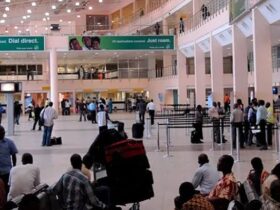Mass migration has increased as a result of the economic crisis in Zimbabwe, with the neighbouring country of South Africa reporting an increase of approximately 31,000 Zimbabweans on an annual average. Comparing this to last year, there has been a huge increase.
The ongoing economic crisis in Zimbabwe has given the country’s decades-long mass migration a new incentive. Inhabitants of Zimbabwe increased from 672,308 at the previous count in 2011 to 1.01 million last year, according to census figures given by neighbouring South Africa.
908,913 of Zimbabwe’s estimated 16 million citizens were residing abroad as of last year, according to emigration figures given for the first time by the country’s statistics office, and 85% of them were in South Africa. Given the high levels of movement between nearby nations and the likelihood that undocumented foreigners won’t participate in demographic surveys, these figures are probably an underestimate.
Zimbabwe, once one of Africa’s best-educated countries and a regional grain exporter, entered a free fall in 2000 as a result of then-President Robert Mugabe’s support for the annexation of land from white commercial farmers. As a result of the decline in export revenues and the ensuing hyperinflation, the national currency was eliminated in 2009.
After Mugabe was overthrown in 2017, Emmerson Mnangagwa declared the nation “open for business,” although less than a tenth of the workforce is technically employed and the majority of those who are struggle to make ends meet. After 2000, land grabs began to decline, but the government has since made a number of other poor policy decisions that have stifled economic growth and damaged investor confidence.
Included in them is the decision to reinstate the Zimbabwe dollar in 2019, which has distorted the foreign exchange market and caused re-inflation. The UK, which lowered entrance requirements last year to address skill shortages caused by its 2016 withdrawal from the European Union and the start of the coronavirus pandemic in 2020, provides additional indication of the continuous labour exodus.
In the 12 months leading up to June, 20,152 Zimbabwean health and social care workers received visas, a nearly five-fold increase over the previous year. It was estimated that more than 112,000 Zimbabweans lived in the UK, which is nearly five times the amount that the African country’s authorities had disclosed ten months earlier.
Over the past year, there has been a “noticeable increase” in immigration to the UK, which has caused a brain drain in a number of different sectors. The low pay that professionals receive and the status of the economy are the main causes, according to Norman Matara, secretary-general of Zimbabwe Doctors for Human Rights.
An increase in the assistance that Zimbabweans living and working abroad give to their family members back home is another sign of the trend towards emigration.
According to the Reserve Bank of Zimbabwe, remittances increased by 15% to $919 million in the six months ending in June from the same period a year earlier and made up 16% of the nation’s $5.5 billion in foreign exchange earnings.








Leave a Reply